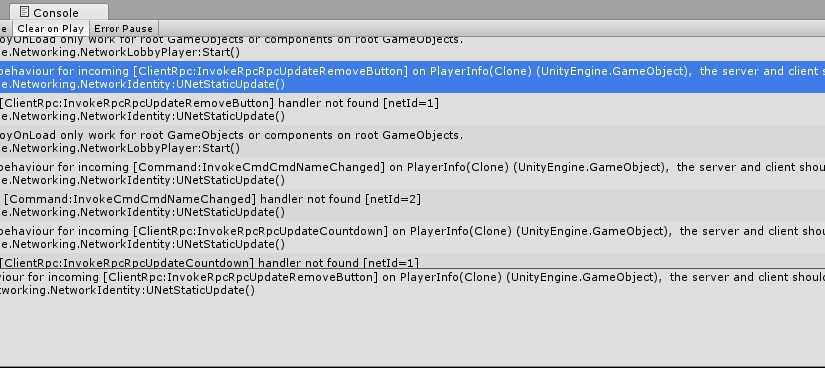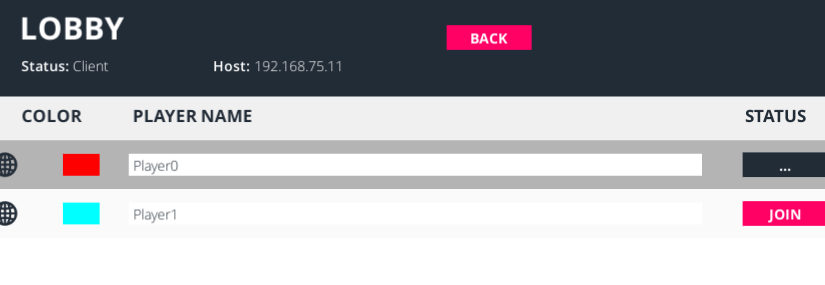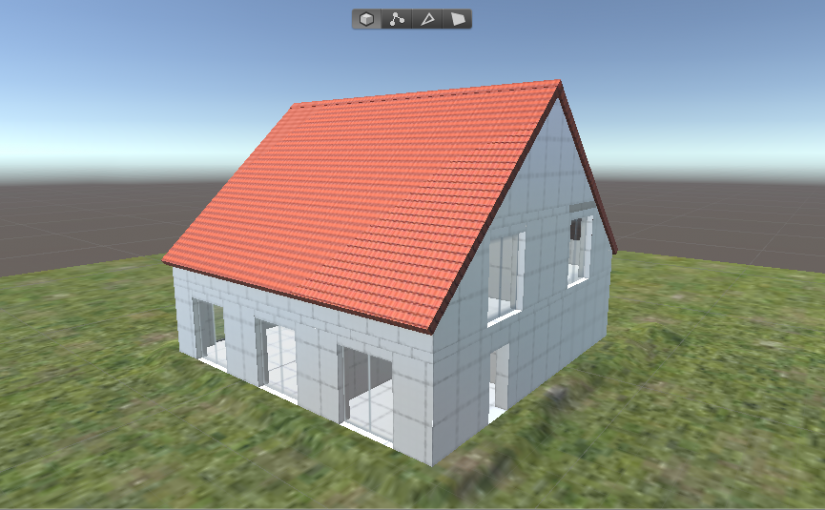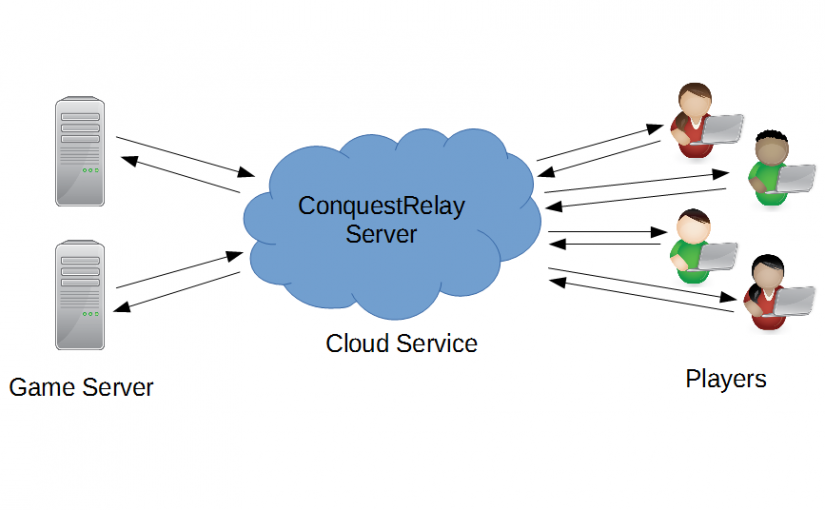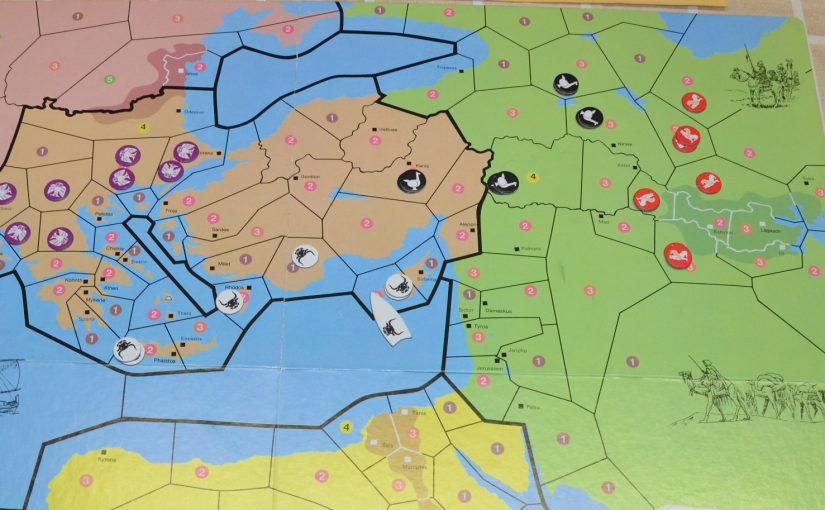Keeping track of your tasks – even in a one-person hobby project – is a good idea. If you do not want to use Excel sheets but try out one of the dozens of project managements tools out there, here is one tip: check the export options first! Otherwise you might fall into the same trap as I did when I tried Favro and moved to Jira a year into the project. Continue reading Check the Export Options
Android Bluescreen
Recently I reached an important milestone for my game: I asked two friends to play it with me. As usual in this case I tried to fix as many of the remaining bugs I knew so that the app would run reasonably stable. And as it always happens when time is running out, I ran into a problem that totally puzzled me. All of a sudden my app showed a bluescreen (!) on two out of three Android devices – sometimes. Wasn’t that a Windows thing? Continue reading Android Bluescreen
No Behaviour for Incoming RPC (UNet Pitfalls #2)
Some problems are so intractable that you almost despair on them, like the one with the RPC error message that haunted me for two months. It was even more stubborn than the one I wrote about in my last post. Imagine you are working happily on your multiplayer game and out of nowhere you get an error that says “Found no behaviour for incoming ClientRPC …”. In this case, I really did not change anything in that part of the code and the error just popped up. Continue reading No Behaviour for Incoming RPC (UNet Pitfalls #2)
UNet Pitfalls: OnStartClient Execution Order
Unity’s UNet multiplayer networking layer is easy to use and a good solution for any project without special demands in this regard. However, doing my second project now with UNet, I repeatedly find some pitfalls which temporarily take the fun out of programming. This time, I wondered about some SyncVars not synchronizing correctly, until I found out that my problems had nothing to do with them. Instead, I discovered that the OnStartClient method of NetworkBehaviours is not always called in the same order with other callbacks such as Awake or Start.
Continue reading UNet Pitfalls: OnStartClient Execution Order
Using ProBuilder for 3D Architectural Sketches
Unity is a great tool for writing games, and especially so if you are just prototyping some new idea. However, Unity is not only great for games, but works for many other applications as well. Making plans for a new home, I’ve discovered that Unity, together with ProBuilder, is quite useful for sketching floorplans in 3D. The results are quite presentable and offer a first impression on how your future home might look like with your current plans. Continue reading Using ProBuilder for 3D Architectural Sketches
Will Lumberyard be a Unity Killer?
Yesterday a colleague sent me a link which absolutely thrilled me: Amazon has published a new game engine, Lumberyard. Why am I excited? Not only is it based on Crytek’s CryEngine, but it integrates Amazon’s AWS cloud service and is completely free at the same time. But is it enough to be a real threat to Unity‘s market dominance? I had a quick look at the Lumberyard page and here is my opinion.
Continue reading Will Lumberyard be a Unity Killer?
ConquestRelay Server available on GitHub
As promised in my August post I cleaned up the code for my relay server and uploaded a first version to GitHub under the name ConquestRelay. It is meant for hobby game developers prototyping their own online games, but still lacks a lot of functionality found in professional network layers.
Civilization: how to not play Crete
Sunday two weeks ago it was once again time for a game of Civilization, the original board game by WdS. Yet again I had to do with Crete as starting position. But unlike in the previous game this time it was a total mess. The following article is an analysis of what you should not do playing Crete if you wish to stand a chance of winning at all.
Conquest! is a popular Name for Strategy Games
Last week I stumbled over a post by Gamasutra member James Bennet about his game “Conquest!”. “Damn”, I thought, “that’s exactly the working title of my own hobby project, even up to the exclamation mark”. But anyway, Conquest is such a catchy name that it’s probably not the first time it has been used, so I did a quick search and this is what I found. Continue reading Conquest! is a popular Name for Strategy Games
A Relay Server based on WebSockets for Online Games made with Unity Personal
As described in my previous post Unity makes it pretty hard for hobby developers to develop their own online games. It is impossible to run a game server created with Unity on an Amazon AWS instance due to the missing batchmode option. As a workaround I implemented a relay server for my current project which is based on WebSockets and allows me to run my own server at home, combined with the benefits of a server in the cloud with a fixed IP address.
Continue reading A Relay Server based on WebSockets for Online Games made with Unity Personal


